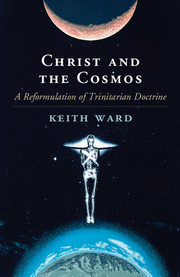Book contents
- Frontmatter
- Contents
- Preface
- Acknowledgements
- PART I THE THREEFOLD NATURE OF THE DIVINE BEING
- PART II THE BIBLICAL SOURCES OF TRINITARIAN THOUGHT
- PART III THE TRINITY, IMMANENT AND ECONOMIC
- 11 Why Three?
- 12 The Trinity and Revelation
- 13 Hegel and Modern Theology
- 14 The Immanent Trinity
- 15 The Identity of the Immanent and the Economic Trinity
- 16 Hegel Again
- 17 What Creation Adds to the Trinity
- 18 The Epistemic Priority of the Economic Trinity
- 19 The Trinity and Naive Realism
- 20 The Trinity and the Cosmos
- 21 Revelation and the Immanent Trinity
- PART IV THE SOCIAL TRINITY
- PART V THE COSMIC TRINITY
- Bibliography
- Subject Index
- Name Index
19 - The Trinity and Naive Realism
from PART III - THE TRINITY, IMMANENT AND ECONOMIC
Published online by Cambridge University Press: 05 September 2015
- Frontmatter
- Contents
- Preface
- Acknowledgements
- PART I THE THREEFOLD NATURE OF THE DIVINE BEING
- PART II THE BIBLICAL SOURCES OF TRINITARIAN THOUGHT
- PART III THE TRINITY, IMMANENT AND ECONOMIC
- 11 Why Three?
- 12 The Trinity and Revelation
- 13 Hegel and Modern Theology
- 14 The Immanent Trinity
- 15 The Identity of the Immanent and the Economic Trinity
- 16 Hegel Again
- 17 What Creation Adds to the Trinity
- 18 The Epistemic Priority of the Economic Trinity
- 19 The Trinity and Naive Realism
- 20 The Trinity and the Cosmos
- 21 Revelation and the Immanent Trinity
- PART IV THE SOCIAL TRINITY
- PART V THE COSMIC TRINITY
- Bibliography
- Subject Index
- Name Index
Summary
Christians worship God as universe-transcending creator and sustainer, as manifest in human form in Jesus, and as the inner spiritual power that unites our lives to the divine life. In a way, this is not difficult or complicated. There is one God, who is known to followers of Jesus in three different forms, ways of being, or modes of existence.
Complications set in when this basically simple statement is turned into a set of unchangeable, precise, and definitive metaphysical descriptions of God's innermost being. The root problem lies in the desire for a naively realistic idea of God. Naive realism is the philosophical view that things as they appear to us must be things as they really are in themselves. If they were not, the fear is that we would be seeing ‘mere appearances’, or even illusions, and we would not be in touch with the real God.
Naive realism is just one philosophical view among others, and it is not very widely held among philosophers. There are many reasons for thinking that reality as it is in itself is not just the same as reality as it appears to us, with our specific sensory and cognitive apparatus. To take just two often-used examples, when we see the moon looking as if it is only a few inches across, that is not how it really is. When we see something looking red, we know (if we know anything about physics) that in reality there is just an electromagnetic wave of a specific wavelength which our sense organs and brains cause us to see as red. The redness is not an objective property, which exists even when we are not seeing it. But of course it is not illusory or false either. It is exactly how electromagnetic waves appear, and should appear, to beings such as us. For reasons such as these, many philosophers are what they call ‘critical realists’. They think there is an existing objective reality that gives rise to our perceptions, but it does not exist exactly as it appears to us. It appears reliably, it does not mislead us, it appears in ways appropriate to our sensory apparatus, but we should not think that we see it exactly as it is in itself.
- Type
- Chapter
- Information
- Christ and the CosmosA Reformulation of Trinitarian Doctrine, pp. 128 - 132Publisher: Cambridge University PressPrint publication year: 2015



